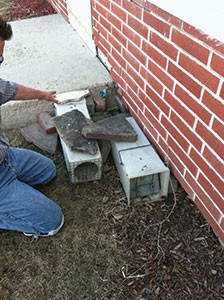
Whenever possible, make “positive sets” when controlling structural-dwelling skunks. Photo: Stephen Vantassel
Skunk odor does not last forever, but can seem to reappear when humidity increases. Here are a few more facts about Mephitis mephitis and their ilk:
⦁ Skunk essence isn’t known to carry rabies, though customer reactions to the odor can range from vomiting to asthma attacks. Get them to fresh air, and consult a medical professional.
⦁ The phenomenon olfactory fatigue occurs when your smelling sensors are so overwhelmed with an odor that you’re no longer able to smell it.
⦁ Skunk damage to turf can be identified by the precise divots in the soil. Over time, skunks will systematically work their way across a lawn.
⦁ Grubbing skunks can be difficult to trap because they don’t seem to be interested in anything other than worms and grubs. Lawn treatments are ineffective, as skunks will continue to grub as long as two weeks following treatment.
⦁ When using box traps, consider sun exposure. Plastic-walled traps are about 10° warmer than a cage trap covered with a denim cloth to two-thirds its length. Failure to appreciate this temperature difference can cause skunks to suffer hyperthermia.
⦁ Skunks can den for weeks at a time when temperatures drop below freezing. Don’t assume empty traps equate to having no skunks under the structure.
Leave A Comment